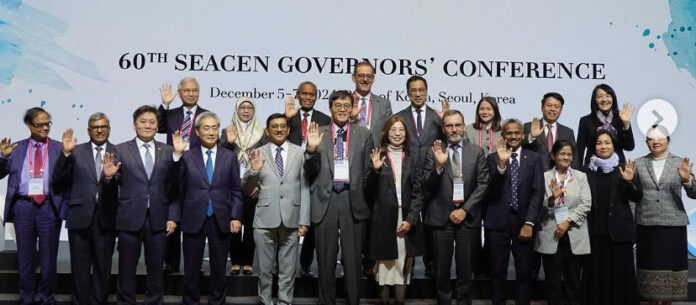In December 2024, the Bank of Korea (BOK) hosted the 60th SEACEN Governors’ Conference and the 44th Meeting of the SEACEN Board of Governors in Seoul.
The event focused on the complex challenges facing the Southeast Asian Central Banks and their approaches to navigating global uncertainties. While SEACEN members, representing 19 central banks across Asia, reported robust growth in 2024—driven by investment, consumer spending, and exports—the economic landscape remains precarious. Trade tensions, geopolitical shifts, and transformative forces like digitization, AI, and climate change have led to an increasingly fragmented global economy, creating difficult trade-offs for central banks.
The Governors’ Conference highlighted the diverse policy tools central banks are employing to address these emerging challenges. The conference’s opening session, moderated by Abdul Rasheed Ghaffour, Governor of Bank Negara Malaysia, featured an insightful special address by Pierre-Olivier Gourinchas from the IMF. He warned that, despite steady global growth projections, the world’s macroeconomic landscape is marked by weakening prospects and rising risks. Gourinchas advocated for a “triple policy pivot”—monetary, fiscal, and structural—aimed at easing pressures and addressing global imbalances.
In a subsequent panel, key officials discussed the need for flexible policy frameworks. They emphasized resilience, which can be bolstered by fiscal, monetary, and financial buffers, integrated policy tools, and regional cooperation. The panelists also cautioned against the unintended consequences of economic policies taken elsewhere and emphasized the importance of staying the course on existing policies, before venturing into new challenges like AI and climate transition.
The second session, moderated by P Nandalal Weerasinghe, governor of the Central Bank of Sri Lanka, focused on the risks posed by geo-economic fragmentation. Hyun Song Shin of the Bank for International Settlements discussed how global value chains are being realigned, which may drive higher funding costs and tighter financial conditions, particularly in emerging markets. The panel emphasized the importance of robust risk management and clear policy communication to navigate these geo-political shifts.
The conference concluded with a call for urgent reforms to tackle long-term structural transformations. With diverse economic conditions across member economies, the SEACEN governors highlighted the need for a tailored approach that balances short-term stabilization with long-term objectives like productivity gains, competitiveness, and sustainable growth.
The 44th Meeting of the SEACEN board of governors, held the following day, underscored the need for strong leadership within the organization. The governors expressed their gratitude to Shaktikanta Das, the outgoing SEACEN chair, for his leadership in 2024. Looking ahead, the governors welcomed Chang Yong Rhee as the SEACEN Chair for 2025 and looked forward to Bank Indonesia’s acceptance to take over the chair in 2026. As the SEACEN community continues to navigate an uncertain future, the emphasis remains on resilience, cooperation, and tailored policy tools to drive sustainable growth across the region.







